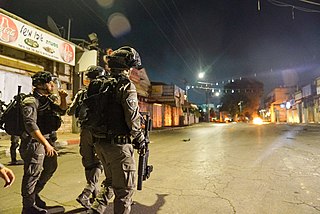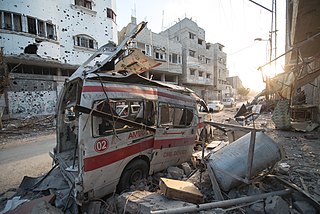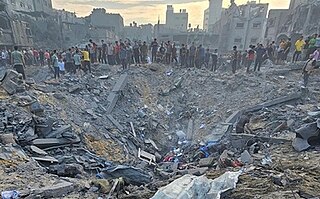In 2004, the Israeli Defense Forces launched Operation "Days of Penitence", otherwise known as Operation "Days of Repentance" in the northern Gaza Strip. The operation lasted between 29 September and 16 October 2004. About 130 Palestinians, and 1 Israeli were killed.

The Gaza War, also known as Operation Cast Lead, also known as the Gaza Massacre, and referred to as the Battle of al-Furqan by Hamas, was a three-week armed conflict between Gaza Strip Palestinian paramilitary groups and the Israel Defense Forces (IDF) that began on 27 December 2008 and ended on 18 January 2009 with a unilateral ceasefire. The conflict resulted in 1,166–1,417 Palestinian and 13 Israeli deaths. Over 46,000 homes were destroyed in Gaza, making more than 100,000 people homeless.

The Al-Dalu family killing refers to the 18 November 2012 deaths of twelve people – ten members of the al-Dalu family, including five children and an elderly woman, plus of two of the family's neighbors, including another elderly woman – resulting from an Israeli air-strike on the family's home in Gaza City during Operation Pillar of Defense. Several nearby houses were destroyed in the attack. At least nine other civilians were hurt. Mohammed Jamal al-Dalu, a member of a Gazan police unit charged with protecting important people, was one of those killed in the airstrike. The Israeli army said that he was the target of the raid.

The 2014 Gaza War, also known as Operation Protective Edge, and Battle of the Withered Grain, was a military operation launched by Israel on 8 July 2014 in the Gaza Strip, a Palestinian territory that has been governed by Hamas since 2007. Following the kidnapping and murder of three Israeli teenagers in the West Bank by Hamas-affiliated Palestinian militants, the Israel Defense Forces (IDF) initiated Operation Brother's Keeper, in which some 350 Palestinians, including nearly all of the active Hamas militants in the West Bank, were arrested. Hamas subsequently fired a greater number of rockets into Israel from the Gaza Strip, triggering a seven-week-long conflict between the two sides. It was one of the deadliest outbreaks of open conflict between Israel and the Palestinians in decades. The combination of Palestinian rocket attacks and Israeli airstrikes resulted in over two thousand deaths, the vast majority of which were Gazan Palestinians. This includes a total of six Israeli civilians who were killed as a result of the conflict.

The 2014 Israeli shelling of UNRWA Gaza shelters were seven shellings at UNRWA facilities in the Gaza Strip which took place between 21 July and 3 August 2014 during the Israeli-Gaza conflict. The incidents were the result of artillery, mortar or aerial missile fire which struck on or near the UNRWA facilities being used as shelters for Palestinians, and as a result at least 44 civilians, including 10 UN staff, died. During the 2014 Israel-Gaza conflict, many Palestinians fled their homes after warnings by Israel or due to air strikes or fighting in the area. An estimated 290,000 people took shelter in UNRWA schools.
From July 8 to August 26, 2014, another conflict between Israel and Gaza escalated and led to the outbreak of a war between Israel and Gaza. Between 2,127 and 2,168 Gazans were killed, including 578 children. The Gaza Health Ministry reported more than 70% of the victims were civilians whilst Israel reported that 55% of the dead were civilians. On the Israeli side 66 soldiers and 5 Israeli civilians, including one child, were killed.
Mass civilian casualties of Israeli bombing, shelling and rocket attacks on the Gaza Strip have occurred in the Israeli–Palestinian conflict, in which Israeli bombing attacks on the Gaza Strip cause numerous civilian fatalities. The reason for such operations is purportedly to carry out targeted assassinations of militants from Hamas, Islamic Jihad and other groups seen to be a threat to Israel, whose Shin Bet data banks monitor thousands of Palestinians for targeting. Israel regards such cases as either unfortunate errors, the consequence of civilians being used to shield militants, or as acceptable collateral damage.

A major outbreak of violence in the ongoing Israeli–Palestinian conflict commenced on 10 May 2021, though disturbances took place earlier, and continued until a ceasefire came into effect on 21 May. It was marked by protests and police riot control, rocket attacks on Israel by Hamas and Palestinian Islamic Jihad (PIJ), and Israeli airstrikes in the Gaza Strip. The crisis was triggered on 6 May, when Palestinians in East Jerusalem began protesting over an anticipated decision of the Supreme Court of Israel on the eviction of six Palestinian families in the East Jerusalem neighborhood of Sheikh Jarrah. Under international law, the area, effectively annexed by Israel in 1980, is a part of the Israeli-occupied West Bank; On 7 May, according to Israel's Channel 12, Palestinians threw stones at Israeli police forces, who then stormed the Al-Aqsa Mosque compound using tear gas, rubber bullets, and stun grenades. The crisis prompted protests around the world as well as official reactions from world leaders.

The Wehda Street airstrikes, known in Palestine as the Wehda Street massacre, took place on May 16, 2021, when Israeli forces bombed al-Wehda Street, a densely populated area located in one of Gaza's most prominent residential and commercial neighbourhoods. The bombardment was the single deadliest operation in an 11-day conflict between Israel and Gaza that erupted after weeks of turmoil in East Jerusalem. Some 44 Palestinian civilians died and approximately 50 were injured in the strike, the heaviest of many that, in exchanges between the IDF and Gaza militants, left 2500 Palestinians homeless, and displaced tens of thousands.
The year 2023 in Israel was defined first by wide-scale protests against a proposed judicial reform, and then by the Hamas-led attack on Israel on October 7, which led to a war and to Israel invading the Gaza Strip.
Events in 2023 in the Palestinian territories.
From 9 October 2023, as part of the Israel–Hamas war, the Israel Defense Forces (IDF) has conducted airstrikes in Jabalia refugee camp, claiming it was a stronghold for Hamas and other militant groups.

Israeli war crimes are the violations of international criminal law, including war crimes, crimes against humanity and the crime of genocide, which the Israel Defense Forces, the military branch of the state of Israel, has been accused of committing since the founding of Israel in 1948. These have included murder, intentional targeting of civilians, killing prisoners of war and surrendered combatants, indiscriminate attacks, collective punishment, starvation, the use of human shields, sexual violence and rape, torture, pillage, forced transfer, breach of medical neutrality, targeting journalists, attacking civilian and protected objects, wanton destruction, incitement to genocide, and genocide.

Since the start of the Israel–Hamas war on 7 October 2023, the UN Human Rights Council has identified "clear evidence" of war crimes by both Hamas and the Israel Defense Forces. A UN Commission to the Israel–Palestine conflict stated that there is "clear evidence that war crimes may have been committed in the latest explosion of violence in Israel and Gaza, and all those who have violated international law and targeted civilians must be held accountable." On 27 October, a spokesperson for the OHCHR called for an independent court to review potential war crimes committed by both sides.

On October 31, 2023, Israel bombed the Jabalia refugee camp in the Gaza Strip – an event that was called the Jabaliya camp massacre in the Muslim world. The airstrike, which came amidst the Israeli invasion of Gaza, killed more than 120 people, mostly women and children, and was widely condemned. It is also considered one of the war crimes in the Israel–Hamas war.
Since the outbreak of the Israel–Hamas war on 7 October 2023, the Israel Defense Forces (IDF) has conducted numerous airstrikes in densely populated Palestinian refugee camps in both the Gaza Strip and West Bank Al-Maghazi refugee camp was struck several times.
Since 2005, Israel Defense Forces have launched thousands of airstrikes on the Gaza Strip from Israel as part of the continuing Gaza–Israel conflict. The airstrikes, widely condemned for targeting civilians, have been described as war crimes by the United Nations, human rights groups Amnesty International and Human Rights Watch. The international community considers indiscriminate attacks on civilian targets to be illegal under international law. Israel says the airstrikes are a response to the rocket attacks by Palestinian militants.

In the Israel–Hamas war, as part of the bombing and invasion of Gaza, the Israel Defense Forces (IDF) has conducted numerous airstrikes in densely populated Palestinian refugee camps in both the Gaza Strip and West Bank.
On 12 February 2024, Israel Defense Forces launched an assault on Rafah, a city in the Gaza Strip, killing over 83 people. The airstrikes destroyed at least one mosque and multiple inhabited homes, killing most or all of their occupants.

Hamas war crimes are the violations of international criminal law, including war crimes and crimes against humanity, which the Islamist Nationalist organization Hamas and its paramilitary wing, the al-Qassam Brigades have been accused of committing. These have included murder, intentional targeting of civilians, killing prisoners of war and surrendered combatants, indiscriminate attacks, the use of human shields, rape, torture and pillage.











